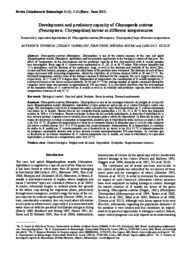Development and predatory capacity of Chrysoperla externa (Neuroptera: Chrysopidae) larvae at different temperatures.
Development and predatory capacity of Chrysoperla externa (Neuroptera: Chrysopidae) larvae at different temperatures.
Author(s): FONSECA, A. R.; CARVALHO, C. F.; CRUZ, I.; SOUZA, B.; ECOLE, C. C.
Summary: Chrysoperla externa (Neuroptera: Chrysopidae) is one of the natural enemies of the corn leaf aphid Rhopalosiphum maidis (Hemiptera: Aphididae) and has potential application in the biological control of that pest. The effect of? temperature on the development and the predatory capacity of this chrysopid fed with R. maidis nymphs was investigated. Fresh eggs of C. externa were maintained at 15, 20, 25 or 30 °C under 70% relative humidity and 12 h photophase, and the duration of the embryonic stage, as well as the duration and viability of the larval (first, second and third instars), prepupal, pupal and adult forms of the predator were evaluated. The duration of each of these stages decreased with increasing temperature, whilst the viabilities of all forms attained 100% at 20 and 25 °C. The threshold temperature and the value of the thermal constant K obtained for the complete life cycle (egg to adult) were, respectively, 10.7 °C and 377.8 degree-days. Independent of temperature, the consumption of R. maidis nymphs by C. externa increased as the larvae reached maturity. At 20 and 25 °C the average number of aphids consumed during the complete larval stage was maximal at approximately 350 specimens. It is concluded, therefore, that the development of the immature forms of C. externa fed on R. maidis as well as its viability and predatory capacity, were favored at temperatures between 20 and 25 °C.
Publication year: 2015
Types of publication: Journal article
Unit: Embrapa Maize & Sorghum
Observation
Some of Embrapa's publications are published as ePub files. To read them, use or download one of the following free software options to your computer or mobile device. Android: Google Play Books; IOS: iBooks; Windows and Linux: Calibre.
Access other publications
Access the Agricultural Research Database (BDPA) to consult Embrapa's full library collection and records.
Visit Embrapa Bookstore to purchase books and other publications sold by Embrapa.

